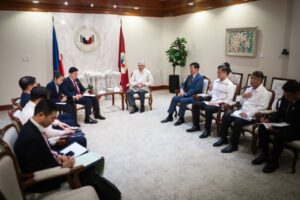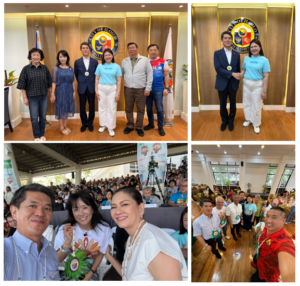
The European Union launched one of the Philippines’ biggest Covid-19 vaccination assistance projects.
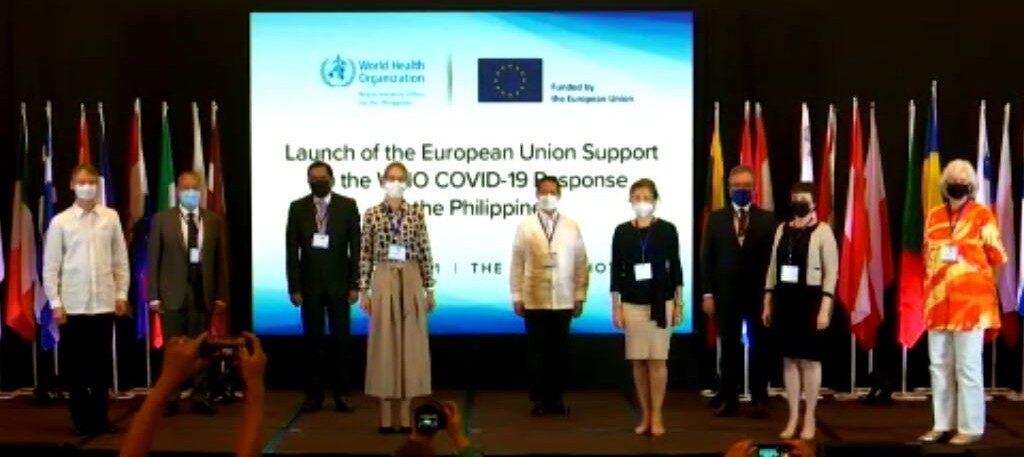
It donated a total of 2.3 million euro or around Php 133 million spread over three years. Part of the assistance will be used to back World Health Organization-backed activities to help prepare for the rollout of Covid-19 vaccines.
The effort is also part of EU’s commitment to help the Covax Facility distribute equitable vaccine supply among middle to low-income countries.
In its launch for the said program, various European ambassadors took turns in relaying their elation over their contribution in the global effort to combat the many challenges wrought by Covid-19. Each one stressed the importance of helping countries like the Philippines, despite their own countries’ own struggle for vaccine supply.

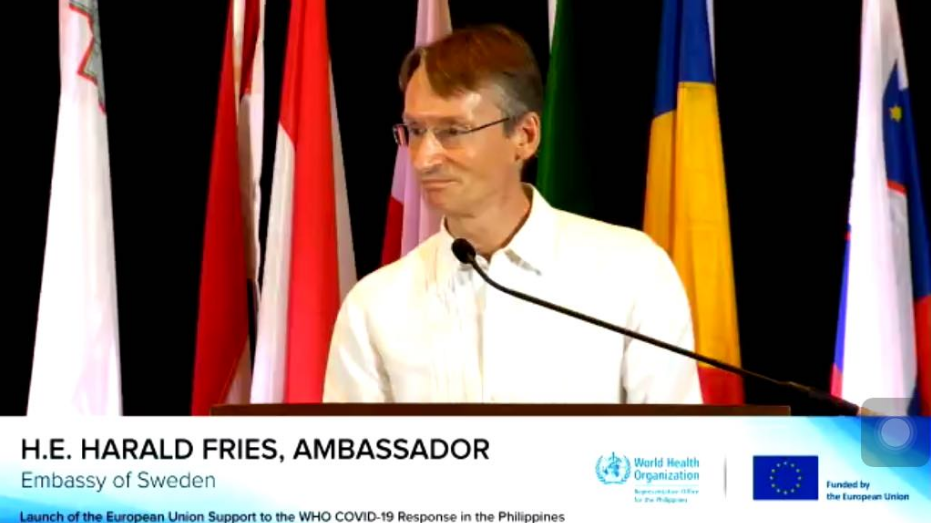

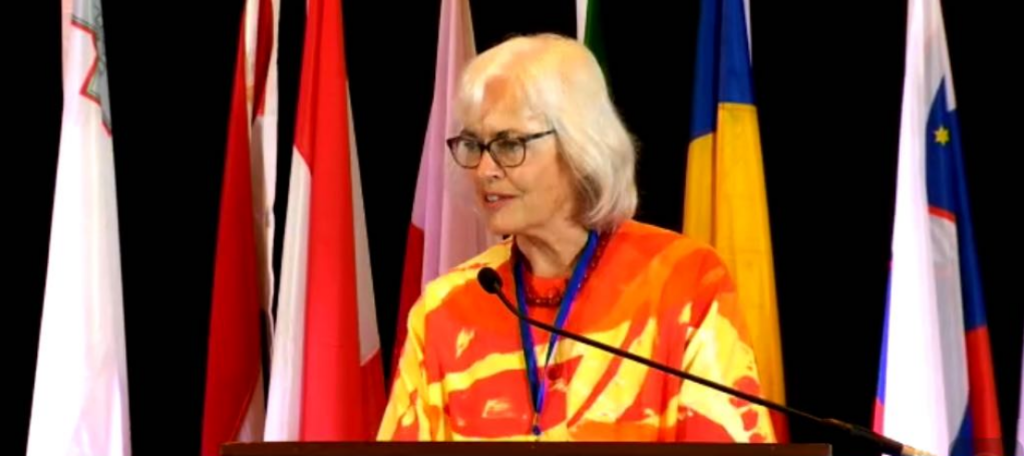
Embassy of the Netherlands
In what can be considered a very straightforward speech, her Excellency Netherlands Ambassador Saskia de Lang said, while a lot of people applauded the Union’s gesture of helping countries outside their own, some were questioning the effort, saying vaccines in their own countries are not even enough to serve the need for vaccine among their citizens.

The ambassador however stressed the EU countries maintain the position that no one can be safe, unless everyone is safe.
Her stand was echoed by other ambassadors and embassy officials who followed her speech, including EU Ambassador to the Philippines Luc Veron during the question and answer portion with media practitioners.

The details of EU’s press statement are hereby presented:
European Union provides €2.3 million to protect Filipinos from COVID-19
Manila, 12/03/2021 – 14:07, UNIQUE ID: 210312_35Press releases


Manila, 15 March 2021 – Secretary of Health Dr Francisco Duque III today joined with the European Union’s (EU) Ambassador to the Philippines, H.E. Luc Véron, and WHO Representative Dr Rabindra Abeyasinghe in launching an EU-funded project to control and supress COVID-19 in the Philippines. Part of the assistance will be spent on WHO-backed activities to help prepare for the roll-out of COVID-19 vaccines. The majority of the funding will be invested by WHO to further strengthen the capacity of the Philippine’s health system to rapidly identify, respond to and supress COVID-19 outbreaks. This also comes in addition to EU funding given to the COVAX facility for the supply of vaccines.
“COVID-19 vaccines have started to arrive in the Philippines but it will be many months before this pandemic is over. That means all of us need to keep doing the basics to control and supress COVID-19. The health system across the Philippines must be able to rapidly identify people with COVID-19, trace their close contacts and provide places for their quarantine and isolation to break the chains of transmission. And everyone from Local Chief Executives, LGU officials to civil society organisations and individual citizens needs to spread the message about COVID-19 prevention,” said Dr Rabindra Abeyasinghe, WHO Representative to the Philippines.
“Global cooperation and solidarity is key to fight COVID-19 and to ensure early access to vaccines, diagnostics and treatments everywhere. No one is safe until everyone is safe. This is why the EU has been leading the multilateral response to make sure no one is left behind. Health security and the start of a sustainable global recovery depend on it.Team Europe is committed to helping Filipinos and the health authorities beat COVID-19. Through the program, the EU is proud to support the roll-out of vaccines in the Philippines,” said His Excellency Luc Véron, Ambassador of the European Union to the Philippines.
Eight-country WHO/EU partnership to supress COVID-19
The project in the Philippines is being funded as part of a € 20.5 million programme between the EU and WHO covering eight priority countries in South-East Asia. The EU is contributing € 20 million to the programme, out of which € 2.3 million (around 133 million PhP) will directly benefit the Philippines. The eight countries are: Cambodia, the Lao People’s Democratic Republic, Indonesia, Malaysia, Myanmar, the Philippines, Thailand and Viet Nam. In all countries, the partnership aims to protect people’s health and access to health services, especially among the most vulnerable by strengthening health systems.
Another aim is to increase coordination and synergies between WHO and the Association of Southeast Asian Nations (ASEAN) on emergency response and preparedness, given the shared objectives, similarities and challenges shared by ASEAN Member States in the region.
Specific areas of actions under the EU grant in the Philippines are:
- strengthening surveillance, risk assessment and contact tracing activities;
- enhancing the functions of national laboratories;
- improving case management, infection, prevention and control;
- utilizing risk communications and community engagement approaches;
- implementing specific public health measures for travel and points of entry;
- scaling up readiness for COVID-19 vaccines;
- identifying and maintaining essential health services and systems; and
- operational support and logistics.
The World Health Organization (WHO) in the Philippines
The World Health Organization (WHO) was established on 7 April 1948 as the directing and coordinating authority in global public health within the United Nations system. Working at three levels in the Organization (global, regional and country), more than 7000 WHO staff worldwide collaborate with the governments of 194 Member States and other partners to achieve the WHO founding vision of the attainment of the highest possible level of health by all people. The Philippines–WHO Country Cooperation Strategy 2017–2022(link is external) sets out how WHO will work with the Philippines over the next six years to realize the vision of the Philippine Health Agenda 2016–2022 as a stepping stone towards the health-related Sustainable Development Goals.
The European Union (EU) in the Philippines
The EU’s support to the Philippines currently focuses on governance, job creation, renewable energy, and assistance to vulnerable populations (specifically in Mindanao which is the poorest region of the Philippines and has been affected by conflicts and population displacement). EU development assistance is closely aligned with the Philippine Development Plan. The Plan provides a framework that allows the EU to align its development cooperation programmes with Government policies and programmes with clear leadership and ownership on the part of the Philippine authorities.
Team Europe is the largest contributor to the COVAX Facility and has to-date provided a total of Php 130 billion, which corresponds to € 2.2 billion, to help 92 low and middle-income countries, including the Philippines, to help gain access to COVID-19 vaccines.
Further information
Watch the launch event live or as video-on-demand at:
https://www.facebook.com/whophilippines(link is external) or https://www.facebook.com/EUDelegationToThePhilippines(link is external)
Ben Duncan, Risk Communication Pillar Lead, WHO Philippines, bduncan@who.int(link sends e-mail) mobile / Viber: +44.7751029495
Thelma Gecolea, Public Affairs Officer, EU Delegation to the Philippines Thelma.gecolea@eeas.europa.eu(link sends e-mail) mobile +639209662066
Jun Ryan Orbina, Communications Officer, WHO Philippines , orbinaj@who.int(link sends e-mail) mobile: +63 906 438 6312
